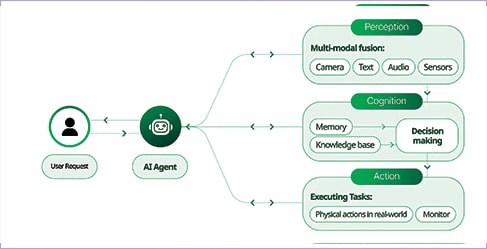Companies are experimenting with AI agents for tasks ranging from coding and payroll processing to more intense ones like chip design.

When a leading German manufacturing company faced challenges with the manual handling of order updates, they turned to ‘AI agents’ for help. Order updates were received in various formats, ranging from emails and PDFs to spreadsheets.
Employees had to extract data like product codes, quantities, and delivery addresses from these, enter them into the enterprise resource planning (ERP) system, and alert concerned stakeholders about the update. This was a back-breaking job that exhausted employees and led to errors too.
By automating 96% of this task using an AI agent from Beam AI, the manufacturing company claims to have experienced an 89% reduction in manual processing time and a 23% decrease in errors, with resultant cost savings.
The AI agent could seamlessly work with the company’s existing ERP system, which made it quick and easy to start. By taking over the routine task of processing more than 300 order updates per day, it freed up the employees’ time for higher-value activities.
In India, when the Covid pandemic triggered an unprecedented surge in broadband demand, Excitel’s subscriber base increased by 55%. Consequently, there was also a rise in support calls, but support staff could not move around safely due to the raging pandemic.
Excitel managed the situation by deploying Aprecomm’s agentic AI-driven Virtual Wireless Expert (VWE), a cloud-based upgrade seamlessly deployed to the Wi-Fi access points of around 500,000 subscribers. Using advanced AI algorithms, VWE enabled real-time monitoring, remote management, and autonomous self-healing.
Excitel reported a 35% improvement in first-call resolution, a 30% reduction in support call duration, and a 62% drop in truck rolls. This enhanced customer experience and network reliability resulted in a dramatic growth in Excitel’s subscriber base to over one million.
“The idea of agents is not new; we have been working on this for a while,” said Thadeous Goodwyn, director of generative AI at Booz Allen Hamilton, in a media interview. “But the reason why it’s getting so much attention now is because large language models and generative AI accelerated some of the characteristics agentic AI needs to be successful.”
Companies—not just large enterprises, but also small and medium-sized ones—across the world have started deploying AI agents for various jobs in software development, customer service, business analytics, human resource management, etc. Interestingly, we even see AI agents being employed in chip design, for activities like code generation, verification, and optimisation.

Deloitte’s State of Generative AI in the Enterprise, published in January 2025, names agentic AI as one of the most closely watched areas in AI development. 52% of the respondents picked agentic AI, while 45% chose multi-agent systems as the most interesting area in AI now.
So, what is this trend all about? Let us attempt to simplify and understand what is agentic AI, how it is different from generative AI, what are AI agents, what kind of tasks can they handle, how do they work, what are their components, how are companies across the world using them, future trends, and challenges, and more.
Table of Contents
Say hello to Agentic AI and AI Agents
We see a lot of terms like generative AI (gen AI), agentic AI, and AI agents strewn around the web, often irresponsibly, without realising that they are different in terms of their core functionality and objectives. So, before we even begin to understand the impact of agentic AI, let us first try to decipher these terms.
Generative AI
Gen AI is primarily focused on creating content such as text, images, video, audio, or software code in response to a user’s prompt. It uses machine learning (ML), large language models (LLM), and reinforcement learning (RL) to study a vast amount of given data and identify patterns and relationships in that. It uses that learning to understand natural language prompts and generate new content in real time.
Agentic AI
An agentic AI system is focused on completing tasks autonomously to achieve a given goal, rather than just creating content or answering questions. It is equipped with advanced reasoning capabilities, and can autonomously make decisions and complete the given job, even in ad hoc situations, with limited or no supervision.
Rather than learn from a prescribed dataset, an agentic AI system learns on the go from the ecosystem it works in. It constantly gathers data, and enhances its knowledge and methods in real time. It can independently analyse a situation, decide what needs to be done, and act to achieve its goal, while also learning from that experience to fine-tune itself.
The key point to be noted is that agentic AI is not about executing single, clearly-defined tasks, but about achieving a goal, which might involve strategising and executing multiple steps or tasks. An agentic AI system can work within an existing organisational setup as part of a chain of command and interact with external tools, databases, and application programming interfaces (APIs).
AI Agents
AI agents can be seen as the building blocks of an agentic AI framework. An AI agent is a simpler task-oriented system with limited scope and functionality, vis-à-vis a broader, goal-oriented agentic AI system. An AI agent is designed to handle a routine, well-defined task, based on pre-defined rules and learned behaviours. It has limited autonomy, to the level required for the assigned task.
There are various types of AI agents, like learning agents, utility-based agents, simple reflex agents, model-based agents, and hierarchical agents, and multiple AI agents can work together in a complex workflow.

And this brings us back to agentic AI system, which would typically string together and orchestrate multiple AI agents to achieve a given goal. It brings together AI agents with the required skills to handle a complex, multi-step process.
While AI agents are usually reactive and respond to specific triggers and requests, agentic AI is more proactive—it recognises a need, designs a solution, and gets it done using the required AI agents.
For example, if you take an agentic AI system for IT support, it might employ and manage different AI agents to handle ticket classification, knowledge base search, user communications, and so on.
Agentic AI Frameworks
An agentic AI framework is a platform that makes it easy to develop and deploy agentic AI systems, which can seamlessly work with other agents, enterprise systems, and humans to achieve the required goals. It provides pre-built components and abstractions, tool integration, memory management, communication fabric, AI models for reasoning, and other basic infrastructure.
The components of an agentic AI framework can broadly be categorised as follows:









